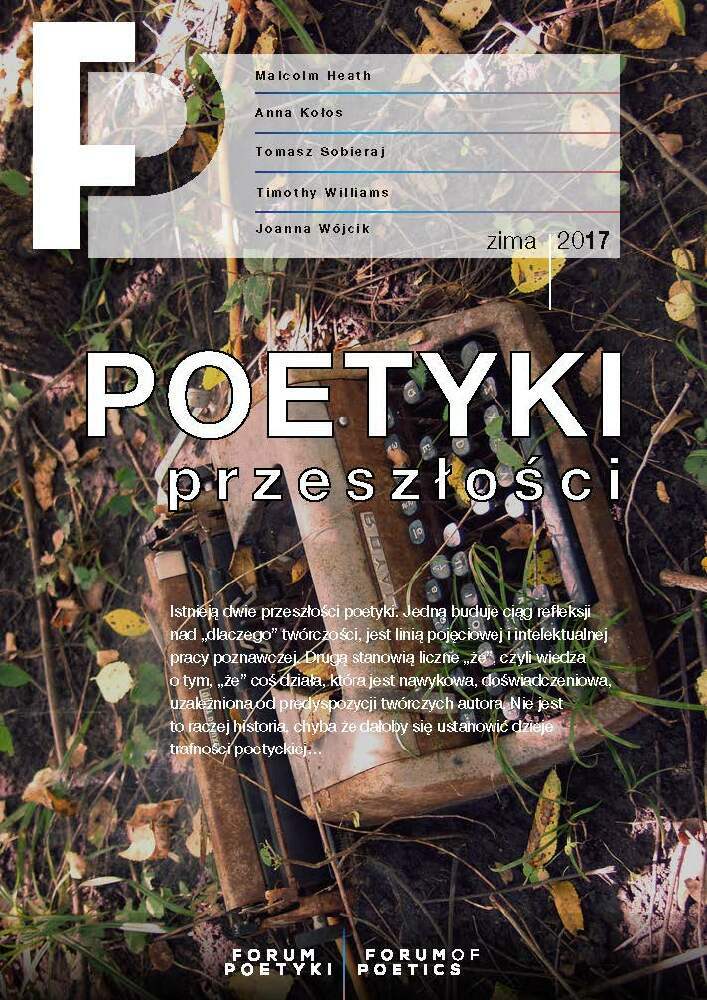Abstract
Przedmiotem interpretacji jest Znikopis Urszuli Kozioł, niewielki utwór z tomu Wielka pauza (1996), czytany na tle wiersza Ars poetica i późnej twórczości Urszuli Kozioł. Staje się on formą arspoetyki jednorazowego użytku, pozbawionej swej uniwersalnej i normatywnej roli i ograniczonej swym zasięgiem do danego, właśnie powstającego tekstu, który zyskuje specyficzną, cielesną materialność. „Znikopisanie” zostaje tu sprzężone z efektem biologicznym, jest konsekwencją „ciałoznikania”, nakierowując uwagę na problem psychosomatycznie rozumianej tożsamości rozpraszającego się „ja”, wyrażanej równolegle przez medium ciała i języka.
References
Boesch, C. and Boesch-Achermann, H. (1999) The Chimpanzees of the Tai Forest: behavioural ecology and evolution (Oxford).
Butler, R. A. (1965) ‘Investigative behavior’, in A.M. Schrier, H.F. Harlow and F. Stolnitz (ed.), Behavior of Nonhuman Primates: modern research trends (New York), 2.463-93.
Cashdollar, S. (1973) ‘Aristotle’s account of incidental perception’, Phronesis 18, 156-75.
Cheney, D. L. and Seyfarth, R.M. (1980) ‘Vocal recognition in free-ranging vervet monkeys’, Animal Behaviour 28, 362-7.
Cleeremans, A. , Destrebecqz, A., and Boyer, M. (1998) ‘Implicit learning: news from the front’, Trends in Cognitive Science 2, 406-416.
Coles, A. (1997) ‘Animal and childhood cognition in Aristotle’s biology and the scala naturae’, in W. Kullmann and S. Follinger (ed.), Aristotelische Biologie (Stuttgart), 287-323.
Crist, E. (2002) ‘The inner life of earthworms: Darwin’s argument and its implications’, in
M. Bekoff, C. Allen and G.M. Burghardt (ed.), The Cognitive Animal: empirical and theoretical perspectives on animal cognition (Cambridge MA), 3-8.
Currie, G. (2006) ‘Narrative representation of causes’, JAAC 64, 309-16.
Darwin, C. (1881) The Formation of Vegetable Mould, through the action of worms, with observations on their habits (London).
Devenport, J. A., Luna, L.D. and Devenport, L.D. (2000) ‘Placement, retrieval, and memory of caches by thirteen-lined ground squirrels’, Ethology 106, 171-83.
Foster, S. E. (1997) ‘Aristotle and animal phronesis’, Philosophical Inquiry 19, 27-38.
Gallop, G. (1990) ‘Animals in the Poetics’, OSAP 8, 145-71.
Gendler, T. S. (2000) ‘The puzzle of imaginative resistance’, Journal of Philosophy 97, 55-81.
Gendler, T. S. (2006) ‘Imaginative resistance revisited’, in S. Nichols (ed.), The Architecture of the Imagination (Oxford), 149-73.
Gibson, E. J. and Pick A.D. (2000) An Ecological Approach to Perceptual Learning and Development (Oxford).
Gibson, J. J. (1979) The Ecological Approach to Visual Perception (Boston). 17
Gomez, J. C. (2004) Apes, Monkeys, Children and the Growth of Mind (Cambridge MA).
Gregorić, P. and Grgić, F. (2006) ‘Aristotle’s notion of experience’, Archiv fur Geschichte der Philosophie 88, 1-30.
Halliwell, S. (2002) The Aesthetics of Mimesis: ancient texts and modern problems (Princeton).
Heath, M. (1991) ‘The universality of poetry in Aristotle’s Poetics’, CQ 41, 389-402.
Heath, M. (1996) Aristotle: Poetics (London).
Heath, M. (2001) ‘Aristotle and the pleasures of tragedy’, in O. Andersen and J. Haarberg ed.), Making Sense of Aristotle: Essays in Poetics (London), 7-23.
Heath, M. (w druku) ‘Heraclides of Pontus on Homer’, in E. Schutrumpf and W.W. Fortenbaugh (ed.), Heraclides of Pontus (New Brunswick).
Jacobs, L. F. and Liman, E.R. (1991) ‘Grey squirrels remember the locations of buried nuts’, Animal Behaviour 41, 103-110.
Kihlstrom, J. (1987) ‘The cognitive unconscious’, Science 237, 1445-52.
LaBarge, S. (2006) ‘Aristotle on empeiria’, Ancient Philosophy 26, 23-44.
Lewicki, P. , Hill, T. and Bizot, E. (1988) ‘Acquisition of procedural knowledge about a pattern of stimuli that cannot be articulated’, Cognitive Psychology 13, 24- 37.
Lorenz, H. (2006) The Brute Within: appetitive desire in Plato and Aristotle (Oxford).
Maroti, E. (2004) ‘Die Sicht des Aristoteles uber die in der Jugend betriebene Sporttatigkeit im Spiegel anderer Quellen’, in H. Heftner and K. Tomaschitz (ed.), Ad fontes! Festschrift fur Gerhard Dobesch zum funfundsechtzigsten Geburtstag (Vienna), 151-5.
Osborne, C. (2000) ‘Aristotle on the fantastic abilities of animals in De Anima 3.3’, OSAP 19, 153-85.
Polanyi, M. (1958) Personal Knowledge: towards a post-critical philosophy (London).
Povinelli, D. J. (2000) Folk Physics for Apes: the chimpanzee’s theory of how the world works (Oxford).
Quandt, K. (1983) ‘On the programmatic formula πρῶτον ἀπὸ τῶν πρώτων in Aristotle’, AJP
104, 358-71.
Reber, A. S. (1993) Implicit Learning and Tacit Knowledge: an essay on the cognitive unconscious (New York).
Reed, E. S. (1989) James J. Gibson and the Psychology of Perception (New Haven).
Rotstein, A. (2004) ‘Aristotle, Poetics 1447A13-16 and musical contests’, ZPE 149, 39-42.
Ste Croix, G. E.M. de (1975) ‘Aristotle on history and poetry (Poetics, 9, 1451a36- b11)’, in B. Levick (ed.), The Ancient Historian and His Materials. Essays in honour of C.E. Stevens (Farnborough), 45-58 = A.O. Rorty (ed.), Essays on Aristotle’s Poetics (Princeton 1992), 23-32.
Stock, K. (2005) ‘Resisting imaginative resistance’, Philosophical Quarterly 55, 607-24.
Tomasello, M. and Call, J. (1997) Primate Cognition (New York).
Tsitsiridis, S. (2005) ‘Mimesis and understanding: an interpretation of Aristotle’s Poetics 4.1448B4-19’, CQ 55, 435-46.
Whiting, J. (2002) ‘Locomotive soul: the parts of soul in Aristotle’s scientific works’, OSAP 22, 141-200.
Wilson, T. D. (2002) Strangers to Ourselves: discovering the adaptive unconscious (Cambridge MA)
License
Authors of articles are responsible for securing the rights to other publications (texts, tables, drawings and other illustrations) quoted or reproduced in their texts.

